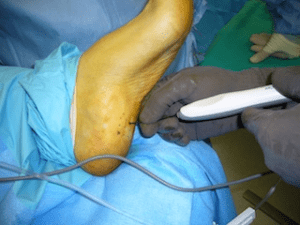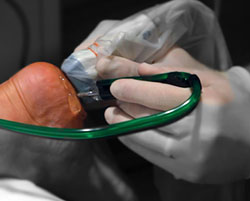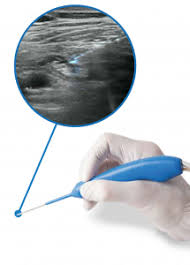What is chronic plantar fasciitis and how is it treated?
The plantar fascia is the amazingly strong thick band of tissue that connects the heel bone to the toes. It supports the arch and helps keep your foot from curling into a ball. Chronic plantar fasciitis is defined as plantar fascia pain experienced for at least 3-6 months without resolution.
Chronic plantar fascia treatments often fail because the blood supply to the fascia region decreases or completely goes away after 3-6 months. This is because the body no longer responds to the injury and doesn’t try to heal itself.
Acute injuries often respond to conservative treatments. A chronic issue, on the other hand, requires some form of stimulation to bring blood back to the region. The increased blood flow prompts the body into healing the damage. Often, conservative treatments are attempted to resolve plantar fasciitis.
Early stage plantar fasciitis treatments include:
- Stretching
- Taping
- Massage and icing
- Shoe modification
- Custom orthotics (or over the counter insoles)
- Physical therapy
Mid level treatments include:
- Cortisone injection
- Shockwave therapy
- Scraping of the fascia
When even conservative plantar fasciitis treatments fail
Sometimes conservative treatments for chronic plantar fasciitis mentioned above do not work. At that point, it is often wise to try regenerative medical treatments, including amniotic cell injection and platelet rich plasma (PRP). These treatments fundamentally “trick the body” into paying attention to the injury and trying again to heal itself long after your body has given up.
Over 95% of our patients are back to normal with the aforementioned treatments. However, a small number of our patients (and a larger number of patients referred to our institutes) have unsuccessful plantar fascia treatment for months or even longer.
At University Foot and Ankle Institute, we have been involved in what we refer to as adjuvant therapy of the fascia, or micro plantar fasciotomy treatments, for over 15 years. We’ve done research on several of the devices used for this type of treatment and even designed some of today’s common procedures.
Advances in plantar fasciitis treatment
Over time, plantar fasciitis treatments have changed and advanced. There are now three options for breaking up the scar tissue in the area. All three treatments, Topaz, Tenex and TenJet have similar goals as well as positives and negatives, which we will discuss now.
Topaz therapy for chronic plantar fasciitis

The original design was through an incision on the side of the foot. The probe was used to fenestrate (pierce with more than one opening) the fascia at differing depths and angels in the region of damage. It would break up scar tissue and microscopic fascia cuts prompted the body to heal the damaged area.
Our research led us to adjust this treatment to be performed through the sole of the foot with about 20-24 needle holes in the area of fascia damage which was identified with ultrasound. The fascia was then fenestrated with the Topaz probe and a burst of energy breaks up the scar and stimulate the body’s own response to help heal the region. The procedure worked very well and patients would be allowed to put weigh of the foot after about one week. Patients could shower in one week and overall did well. The only problem is that the multiple incisions can be painful for a while and took time to heal.
Tenex therapy for chronic plantar fasciitis

The procedure was done through a small opening but required a week or so to heal. I never found the results to be amazing. The main problem was the large probe made a lot of cuts in the fascia and took time to heal.
At times, the larger cuts in the fascia with the large probe could cause scar tissue. While I did not see this in our patients, we treated several patients from other respected foot and ankle surgeons. Eventually the Tenex probe was not part of our treatment options.
TenJet therapy for chronic plantar fasciitis

The tip is small and controlling the amount of scar tissue break up is very easy. This is because of the probe size and the ability to do the procedure under ultrasound guidance. The water jet breaks up the scar tissue and the probe, which is attached to a suction machine, sucks out the scar tissue. It is very slick and fairly easy to perform once a person is trained.
The patient can place weight on the foot immediately. However, many patients prefer to use crutches for a few days and place limited weight on the foot. A boot is worn for a week and then physical therapy is started. Patients can shower after 5 days.
Added options to boost plantar fasciitis healing
The goal of all three treatments is scar tissue break up and increase of blood supply to the damaged region. However, a boost to the body and any additional help we can provide is a bonus.
We suggest adding a PRP or amniotic cell injection to the plantar fascia region during any of three procedures. This added boost of stimulation assists the body to better heal the fascia. It is done in the operating room or procedure room during the surgery itself.
Conclusion
All three options are great for chronic plantar fasciitis treatment but our current best practices option is the TenJet therapy with a boost of PRP or amniotic cell injection. The procedure is very safe, does not release or majorly cut into the fascia, breaks up and removes scar tissue and stimulates the body to heal itself. It has a very short recovery time with no or minimal non-weight bearing.
If you would like more information on plantar fasciitis treatments, we encourage you to call us at (877) 736-6001 or visit us at www.footankleinstitute.com.
- The Power of Pediatric Flexible Flatfoot Procedures - September 21, 2023
- StimRouter: A Revolutionary Approach to Targeted Pain Relief - August 21, 2023
- Is Cosmetic Foot Surgery Safe? Or Are You Starting Off on the Wrong Foot? - May 17, 2023

Leave a Reply